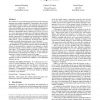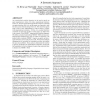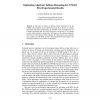1445 search results - page 223 / 289 » Abstract Interpretation of Logic Programs |
129
click to vote
TLDI
2010
ACM
15 years 6 months ago
2010
ACM
ML modules are a powerful language mechanism for decomposing programs into reusable components. Unfortunately, they also have a reputation for being “complex” and requiring fa...
POPL
2012
ACM
13 years 5 months ago
2012
ACM
We present a general theory of Gifford-style type and effect annotations, where effect annotations are sets of effects. Generality is achieved by recourse to the theory of algebra...
ATAL
2010
Springer
14 years 11 months ago
2010
Springer
An organizational modeling language can be used to specify an agent organization in terms of its roles, organizational structure, norms, etc. Such an organizational specification ...
DLOG
2010
14 years 7 months ago
2010
In this paper we outline an algebraic tableau algorithm for the DL SHOQ, which supports more informed reasoning due to the use of semantic partitioning and integer programming. We ...
131
click to vote
IDA
2005
Springer
15 years 3 months ago
2005
Springer
Abstract. This paper introduces Higher-Order Bayesian Networks, a probabilistic reasoning formalism which combines the efficient reasoning mechanisms of Bayesian Networks with the...



